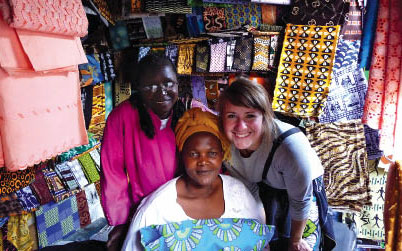
While many graduates of the Department of Fashion and Apparel Studies aspire to work in New York, Paris, Milan or Hong Kong, Katie (Weber) Groop, EP ’08, found her calling in Zambia.
The Delaware native spent two months of the summer after her graduation sharing her pattern making and sewing skills with several Zambian women who work as housemothers in an orphanage, enabling them to provide clothing for the children in their charge and to perhaps start their own businesses.
Groop learned of the opportunity through her church, which supports the orphanage and the organization that founded it, All Kids Can Learn International. The organization operates several orphanages in Namibia and Zambia that provide a homelike atmosphere and education for the children, who often have been left parentless by AIDS.

“When you get to your junior and senior year, you really start wondering what to do with what you’ve learned in college,” Groop says. “I’ve always had a heart for Africa, and I’ve always wanted to serve there, but I also wanted to use my major. My mom suggested I e-mail a couple from my church who run the Village of Hope orphanage, and it turned out they had been wanting someone to teach sewing.”
Planning for the trip got a little overwhelming, Groop admits, as it became mixed together with planning for her graduation and her wedding to her husband, Alex, which took place in the fall after her return from Africa.
“I wasn’t sure of everything I would need,” she says. “I was glad, though, that the village had two sewing machines already. I mainly brought fabrics, some tools, pattern paper and the patterning books and rulers that I used in class at UD.”
When she first arrived at the Village of Hope in central Zambia, Groop found a collection of three houses, each home to about eight children, ranging from infants to 12-year-olds. A fourth house was under construction. A housemother cares for the children in each dwelling. The children attend the village school but were on a month-long break during much of Groop’s visit, allowing her plenty of time to get to know them.
In addition to their schoolwork, the children are taught agricultural skills, and the older ones help to run the farm associated with the orphanage in order to ensure that they have the ability to support themselves and their families as adults.
During her stay, Groop worked primarily with two women, one a housemother named Rose Mungoma and the other a local resident, Mary Zulu, who had plans to open a wedding dress shop.
“I tried to cram into them in two months what I learned in four years,” Groop says. “We had ‘sewing class’ most days from 10 to 6. I tried to have lesson plans, but I mostly just went with my gut. We basically just started from the beginning because the women had to learn English measurements as opposed to metric in order to work with my patterns and rulers.”
She says it was a day of great celebration when Mungoma completed her first garment, a simple, button-back dress for one of the girls in her household. By the time Groop left, each of the five girls in the house had a new dress.
“When I left, Rose had basic pattern blocks in each kid’s size and knowledge to pass on to other women,” Groop says. “Our whole goal was to be able to clothe the village. In Africa, a lot of clothing is donated, but it is not always in good shape. And everyone wants to look good.”
She says she gained a great appreciation for the local textiles, colorful fabrics called chitenge, which can serve as a skirt, an apron or a baby carrier. She enjoyed long walks into the town of Chisamba with her two students and a trip to the capital city of Lusaka, about an hour away, to shop for fabrics.
“Rose was so excited and grateful to be fulfilling her dream of learning to design and sew. She called me ‘Teacher,’” Groop says. “I did learn that I love to teach. It was a fantastic experience, having the passion for it and knowing I was supposed to be there.”
Since her return to the U.S., Groop has done some freelance design work, but much of her thinking about the future has centered on her desire to return to Zambia with her husband to continue the work she began last summer.
“I would like to help set up a sewing room with a shop for the village, where we can teach sewing to more women and girls. If something is taught, it has to be something that can help them support themselves,” she says, noting that sewing and fabric crafts have been a good source of income for the local women so far. She would also like to work more with a group called the Chimwemwe Ladies (chimwemwe means “happiness”) that has formed to produce crafts for sale in the United States.
While Groop is pleased that she was able to achieve many of her goals for her work in Africa, she has even more for the future, although she points out that one of the main cultural differences she perceived in Zambia was less goal orientation.
“People there are really about relationships. They take the time to know each other,” she says. “No one was ever in a rush to get out of my presence because they had so much to do.”
For more about the Village of Hope program, visit All Kids Can Learn at www.akcli.org.
Article by Beth Chajes





